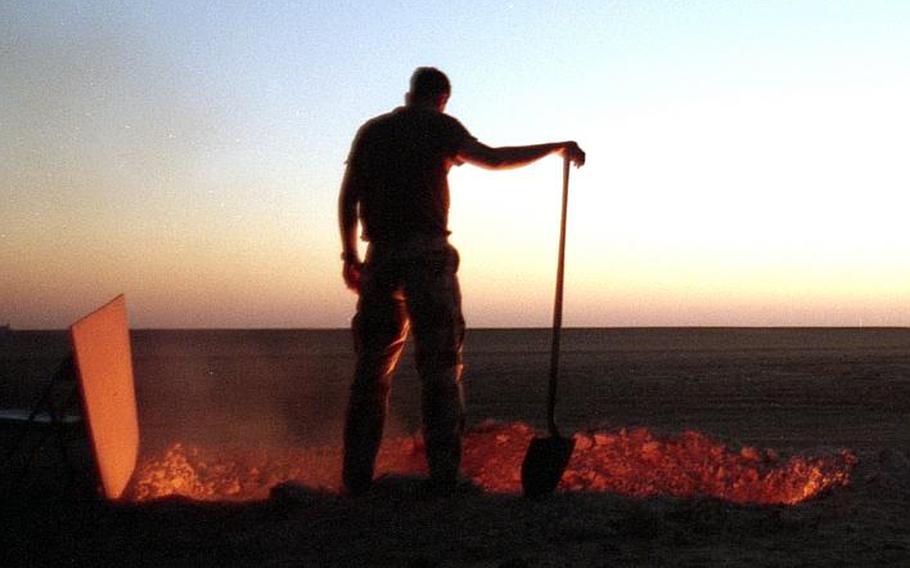
An American servicemember in the Saudi Arabian desert in 1991 tends a burning trash pit.
(Vince Crawley/Stars and Stripes)
WASHINGTON – The Department of Veterans Affairs will initiate the federal rulemaking process to consider creating a fast track to health care and disability compensation for some veterans suffering from respiratory illnesses.
The effort could result in health care and benefits for veterans who were exposed to burn pits or other toxins while deployed to overseas conflicts in Southwest Asia, Afghanistan and Uzebekistan.
In an announcement Thursday, the VA listed asthma, sinusitis and rhinitis as conditions that could be added to the VA’s presumptive list, which lowers the amount of evidence that veterans must provide in order to receive benefits. VA Secretary Denis McDonough said it was possible that more conditions would be considered during the rulemaking process.
“This is just the beginning of our effort to help veterans suffering from toxic exposure, not the end of that effort,” McDonough said during a news conference Thursday. “This is an urgent, ongoing process and we will stop at nothing to make sure the veterans have the care and benefits they earned and which they deserve.”
Throughout the 1990s and the post-9/11 wars, the military used open-air pits to burn garbage, jet fuel, paint, medical waste, plastics and more. Veterans diagnosed with cancer, respiratory issues and lung disease at young ages have blamed exposure to the toxic fumes. They have sought VA benefits and health care, but the department has contended that there isn’t sufficient evidence to support their claims.
Once confirmed as VA secretary, McDonough started a review of scientific evidence regarding toxic exposure. The department chose to move forward with a rulemaking process to make decisions transparently and with input from veterans, he said.
The rulemaking process, which can be lengthy, includes a public comment period and multiple reviews by the White House’s Office of Management and Budget. The VA will provide public updates about the process every three months, McDonough said.
Earlier this week, House and Senate lawmakers introduced two sweeping bills aimed at helping veterans who suffer from illnesses because of toxic exposure. The bills would grant VA health care and benefits to millions of veterans who served in overseas conflicts in the past 31 years.
The bills – which are similar but not identical – would automatically grant health care to about 3.5 million Iraq and Afghanistan veterans and reform the VA’s handling of toxic exposure claims. The House bill adds 23 respiratory illnesses and cancers to the VA’s presumptive list, while the Senate bill adds 11.
The Senate Veterans’ Affairs Committee advanced its bill Wednesday to the Senate floor. Leaders of the bills are expecting pushback from other lawmakers because of the cost. Cost estimates for the bills were unknown Thursday but are likely significant.
McDonough refused Thursday to take a position on either bill.
“We’re down here, really vigorously working to try to get in a position to get assistance to, and care for, our veterans who have been exposed, and I think the quickest way to get that care and those benefits is through the process I’ve talked about,” McDonough said, referring to the rulemaking process. “We are attacking this issue with urgency.”
Wentling.nikki@stripes.com
Twitter: @nikkiwentling